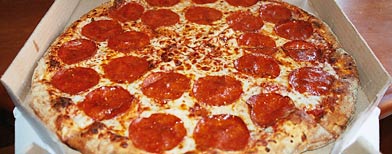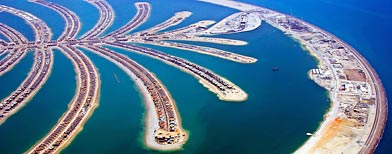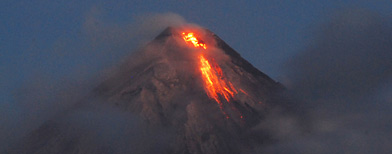- Never criticize a man until you've walked a mile in his moccasins.
- ~ Native American Proverb
Welcome to ...
Windmills Tilted, Scared Cows Butchered, Lies Skewered on the Lance of Reality ... or something to that effect.
Wednesday, December 16, 2009
Proverbial Wisdom
Newly Discovered Enzyme Could Create Crops That Thrive in Dry, High CO2 Conditions

Photo via UCSD, Credit: Julian Schroeder Lab
Researchers at University of California San Diego have discovered particular plant enzymes that can make a big difference in food safety as the planet copes with two major problems: higher and higher levels of carbon dioxide and lower and lower water resources. The enzyme causes the plants to react to CO2 and change how they use their pores, and by manipulating the enzyme, researchers believe new, more CO2- and drought-tolerant crops could be created.
Why are the Alps getting taller?

Here's a conundrum: The African and European plates of the Earth's crust are no longer pushing into each other, but the Alps (created by the collision of those plates) are growing by about .05 in. per year. At first glance, those facts might make you question plate tectonics. But the real explanation is even weirder.
The Alps grow because they swim in the Earths mantle. Mountains like the Matterhorn or the Zugspitze lose one meter of stone every 1000-2000 years, Sauer reports. Like a melting iceberg slowly rises out of the water to adjust to the loss of weight, the alps rise according to their weight loss due to erosion. Sauer explains, that this was a hypothesis for years, but that it is proven now, because German scientists from the Research Center for Geoscience in Potsdam developed a new method to measure the erosion.
Original story is in German at Neue Zürcher Zeitung.
English summary from the Knight Science Journalism Tracker
Mathematical mockery in Wonderland
From New Scientist:
Outgunned in the specialist press, Dodgson took his mathematics to his fiction. Using a technique familiar from Euclid's proofs, reductio ad absurdum, he picked apart the "semi-logic" of the new abstract mathematics, mocking its weakness by taking these premises to their logical conclusions, with mad results. The outcome is Alice's Adventures in Wonderland.
Take the chapter "Advice from a caterpillar", for example. By this point, Alice has fallen down a rabbit hole and eaten a cake that has shrunk her to a height of just 3 inches. Enter the Caterpillar, smoking a hookah pipe, who shows Alice a mushroom that can restore her to her proper size. The snag, of course, is that one side of the mushroom stretches her neck, while another shrinks her torso. She must eat exactly the right balance to regain her proper size and proportions.
While some have argued that this scene, with its hookah and "magic mushroom", is about drugs, I believe it's actually about what Dodgson saw as the absurdity of symbolic algebra, which severed the link between algebra, arithmetic and his beloved geometry...
The madness of Wonderland, I believe, reflects Dodgson's views on the dangers of this new symbolic algebra. Alice has moved from a rational world to a land where even numbers behave erratically.
Smog swallows world-famous skyline

Smog swallows world-famous skyline
Hong Kong once boasted spectacular views — but now it offers up apocalyptic visions.
Beware of fine print on dining gift cards

Beware of fine print on dining gift cards
Discount restaurant certificates could come with a lot of strings attached.
More 'eyes in the sky' over Afghanistan

More 'eyes in the sky' over Afghanistan
Reaper drones and the top-secret Beast of Kandahar will support the U.S. troop surge.
Famous brands tweak their recipes

Famous brands tweak their recipes
Domino's says it's changing its pizza recipe in just about every way.
McDonald's to offer free wireless

McDonald's to offer free wireless
The fast-food giant drops their hourly fee for Wi-Fi service across the U.S.
City of 230,000 with no bookstore

City of 230,000 with no bookstore
If the bookstore in Laredo, Texas, closes, the nearest will be 150 miles away.
Gut-busting holiday foods without guilt

Gut-busting holiday foods without guilt
Enjoy eating your favorite holiday treats without finding yourself in a bigger pant size.
After 300 years, Britain to banish checks

After 300 years, Britain to banish checks
The surprisingly high cost of processing checks drives banks to phase them out completely.
Reasons not to retire — yet

Reasons not to retire — yet
Every year you delay retirement, Social Security benefits will increase 7-8%.
Countries struggling with massive debt

Countries struggling with massive debt
Experts fear these nations will have trouble paying back their giant loans.
2009's dumbest moments in business

2009's dumbest moments in business
For five years, one company paid a six-figure salary to a candidate who actually rejected its job offer.
Brazil toddler has 50 sewing needles inside body, doctors say they apparently inserted
A 2-year-old Brazilian boy has as many as 50 metal sewing needles inside his body and a doctor treating the boy said Wednesday they were apparently stuck there one by one.
Full StoryAustrian angry over divorce case shoots, kills court official during failed hunt for judge
Man's Blood Donations Reach 80 Gallons
Man's Blood Donations Reach 80 Gallons
'Vampire leader' jailed over threats
'Vampire leader' jailed over threats
Pair accused of faking death from bad oysters
Pair accused of faking death from bad oysters
Daily Ha Ha
The doctor said, "Well don't go there anymore"
NC woman lay dead in bed for months despite visits
NC woman lay dead in bed for months despite visits
I should say so!
Although I suspect the lady's medicaid checks kept rolling in ...
Kid trampling for a cure
'Santa' cited for open intoxicants
How shellfish saved the human race

A couple hundred thousand years ago, the planet became a much colder and drier place. In Africa, deserts expanded, species were wiped out and the human race was in deep trouble.
See, humans today may look pretty different from one another but, genetically speaking, there's not much diversity at all within our species. In fact, chimpanzees, which look pretty much the same from one individual to the next, are much more genetically diverse than we are. To scientists, that suggests that humans have come through a genetic bottleneck--a point where our numbers shrunk dramatically, and a relatively small population had to rebuild the species. For about 20 years, genetic anthropologists have been comparing the genes of modern human populations. Over time, they've used bigger and bigger samples, and better and better analysis, to hone in on when our bottleneck likely happened, and how many humans managed to slip through it.
Turns out, somewhere between 130,000 to 190,000 years ago, the human species was reduced to less than 1000 breeding individuals--just a few thousand people in total. Ancient, naturally driven climate change pushed our species to the brink, said Curtis Marean, Ph.D., a professor with the Institute of Human Origins and the School of Human Evolution and Social Change at Arizona State University.
What saved us? According to Marean, the answer may be "shellfish".
"They're a great source of protein," he said. "And shellfish are immune to colder ocean temperatures. In fact, when the water gets colder, those populations go up."
Marean used climate models to pinpoint locations in Africa where human hunter-gatherers could have hunkered down during a long glacial period that dried out the continent and expanded deserts. Of the four-to-six possible locations, he focused in on an area along the coast of South Africa.
"That area has a super high diversity of below-ground tuberous plants, which have high carb loads. People are excellent foragers for them. You need a digging stick and there wouldn't be a lot of animal competitors," he said. "And the tuberous plants are adapted to arid environments."
His team eventually found a site, dating to 164,000 years ago, that shows evidence of humans eating shellfish, working with natural pigments and creating technologically sophisticated tools. He thinks this could be the remnants of the humans of the bottleneck--ancestors of everyone alive today.
Other researchers have theorized that eating shellfish was actually the driver that allowed humans to develop the big brains we enjoy today, because shellfish are high in the Omega 3 fatty acids that the brain needs to function. But Marean thinks the big brain came first. You can't just walk down to the beach and score yourself some sweet shellfish action (at least, not enough to sustain a society) without being pretty bright. Ancient humans would have had to be able to do some pretty complex thinking about concepts like time, Marean said. They would have to be able to make connections between unrelated things, like phases of the moon, tides and when shellfish were most plentiful. And they'd have to be able to communicate all that to other people.
From Marean's perspective, big brains enabled a small group of humans to make the switch to a shellfish diet--an adaptation that allowed them to survive a climactic upheaval that wiped out most of their peers.
Naturally, this all begs the question, "Could humans adapt to and survive modern, anthropogenic climate change as well?" Again, Marean thinks the answer lies in our food supply.
"These people were hunter-gatherers, and beauty of a hunting and gathering economy is that it's very flexible. If you use 80 plants and 14 animals, and you lose 10 plants and two animals, you can just shift your resources. When you commit yourself to agriculture that has very narrow environmental parameters, and your whole population is dependent on that, slight changes in the environment can have catastrophic effects," he said. "I'd say we have the cultural and technological ability to make a change and adapt. But we need to get busy."
Science News
 | The European Space Agency has released the first scientific results from the recently launched Herschel Space Telescope. |
| | Scotland's wild red deer are changing shape due to breeding with a foreign species, a new study finds. |
Dangers of energy-efficient traffic lights

Dangers of energy-efficient traffic lights
Several U.S. cities are discovering that the new LED bulbs can create a winter hazard.
Foods not to ditch when you're on a diet

Foods not to ditch when you're on a diet
Cutting out starchy foods such as bread or potatoes could backfire on your weight-loss goals.
Volcano menaces with fresh explosions

Volcano menaces with fresh explosions
Eruptions of ash and lava from the Philippines' Mayon volcano look all too familiar to locals.
Getting a home loan to become harder

Getting a home loan to become harder
The credit score required for the best mortgage rates may be much higher than you think.
Why more Americans have blurry vision

Why more Americans have blurry vision
Nearsightedness in the U.S. has increased 66 percent since the 1970s, a study shows.
How bad hyperinflation can get
The cumulative devaluation of the Zimbabwe dollar was such that a stack of 100,000,000,000,000,000,000,000,000 (26 zeros) two dollar bills (if they were printed) in the peak hyperinflation would have be needed to equal in value what a single original Zimbabwe two-dollar bill of 1978 had been worth. Such a pile of bills literally would be light years high, stretching from the Earth to the Andromeda Galaxy.
Daily Almanac
There are 15 days left in the year.
Today In History December 16
Our Readers
Birmingham, England, United Kingdom
Toronto, Ontario, Canada
Woking, England, United Kingdom
New Westminister, British Columbia, Canada
Binche, Hainaut, Belgium
Etobicoke, Ontario, Canada
Chennai, Tamil Nadu, India
Bern, Bern, Switzerland
Hanoi, Hanoi, Vietnam
Calgary, Alberta, Canada
as well as Latvia, and the United States
Daily Horoscope
From the starting point, the finish line looks far, far away.
However, once you hit your stride, you'll eat up the distance like it's nothing.
It doesn't matter whether you're working out, taking on a new business project or changing your entire lifestyle.
The same rules apply: Concentrate on the moment.
Put every ounce of energy into the task at hand.
You'll be exhausted when you finish -- but you'll finish far sooner than you might expect.
Cool.


